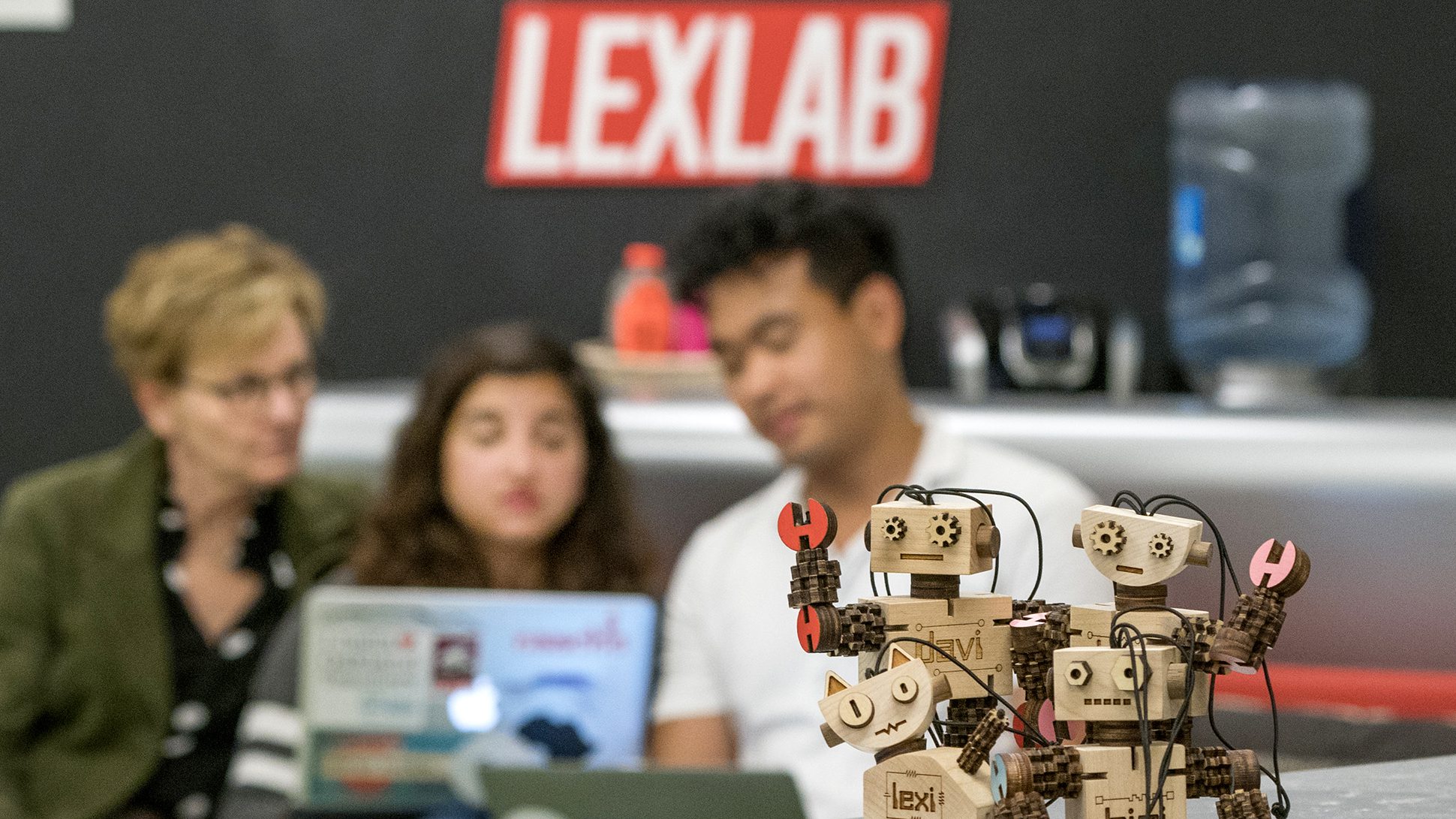What's Next for LexLab?
UC Law SF students will have the opportunity this fall to study the evolving interplay between the law and new technologies, such as automated driving systems, blockchain, commercial drones and 3D printing.
The course offered through the law school’s LexLab will be co-taught by Allison Drutchas and Shane Glynn, leading lawyers at two innovative tech companies. Drutchas serves as policy and product counsel at self-driving technology company Waymo, while Glynn is co-founder and General Counsel of MobileCoin Inc.
The “Regulation of Emerging Technologies” course is one example of how LexLab, an innovation hub for emerging legal technologies, is trying to build out its curriculum and other programming in its second year on campus.
Expanding the Legal-Tech Hub
“We turned an idea into a reality over the course of the last year,” said Alice Armitage, chief executive professor of LexLab. “Coming up we really need to grow that and make it a more solid foundation.”
Another new class LexLab will offer this fall will have students attempt to develop technological solutions to address the legal issues making it difficult for San Francisco’s homeless to get off the streets.
The course taught by Armitage will build toward a two-day hackathon featuring the students teaming up with engineers, entrepreneurs and lawyers from around the region to improve their tech-based ideas for combating homelessness.
Then in the spring Armitage will again teach a course about how to build a legal tech startup. Students in the class work in teams to craft solutions to address pain points in the legal system, and the semester ends with a live pitch competition before a panel of legal tech entrepreneurs.
Both that class and the one focused on homelessness are designed to help students develop interdisciplinary problem-solving and design thinking skills.
“If they are going to work in San Francisco and with startups, they will have a much better sense of how entrepreneurs think and view things such as risk,” Armitage said.
LexLab also hopes to launch a class in the spring titled “Coding for Lawyers.”
A Home for Startups
Drew Amerson, the director of LexLab, said the program hopes by the end of the academic year to get approval for either a certification or concentration in law and technology for students. The LexLab classes are open to 2Ls and 3Ls.
LexLab also features an accelerator for legal tech startups that provides co-working space, mentorship and plenty of networking opportunities.
 Companies enrolled in the incubator-like offering also are automatically enrolled in Hastings’ Startup Legal Garage, a program in which law students under the supervision of attorneys conduct legal work for early-stage tech and biotech startups.
Companies enrolled in the incubator-like offering also are automatically enrolled in Hastings’ Startup Legal Garage, a program in which law students under the supervision of attorneys conduct legal work for early-stage tech and biotech startups.
The accelerator welcomed its first cohort of companies this spring, with four startups entering the semester-long program.
One of the accelerator companies was Syntexys, a document analytics startup that uses machine learning and statistical natural language processing to provide business insights, mitigate risk, and predict contract outcomes.
Ansel Halliburton, Syntexys’ CEO, said his company’s experience in LexLab was very positive and helped hone its investment pitch. Getting to sit in on one of Armitage’s classes in which strategic consultant Andy Raskin spoke about pitching was a highlight.
“His session was very helpful, and we kind of changed everything after that,” Halliburton said.
Halliburton said he also appreciated the opportunity to share experiences with and ask questions of the other entrepreneurs. Given his terrific experience, Halliburton hopes to return to teach the planned Coding for Lawyers class.
The accelerator program ultimately builds toward a demo day event in which the companies make pitches to potential investors.
Engaging the Legal and Tech Communities
Amerson said he is hopeful there will be an even broader pool of financial backers for the accelerator participants moving forward. LexLab is working with a Hastings alumnus who is interested in putting together a syndicate of angel investors.
“They are not going to be committed to investing in any of the companies in our startup accelerator, but they will have sort of a first look and get to interact with these companies,” Amerson said. “Then when it comes to demo day, we will have a pool of UC Law SF’ alums who could invest in these companies.”
Both Amerson and Armitage said there has been great interaction between the accelerator companies and Hastings students, including the entrepreneurs sitting in on the legal tech startup class and providing feedback at times. Some of the students also became paid interns at the companies.
The interplay has helped LexLab make progress on its goal of providing consistent community engagement around legal tech issues.
“We really do see ourselves as a hub,” Amerson said. “We want to bring technologists, lawyers and law students together.”
Meanwhile, the third major component of LexLab is hosting regular large and small-scale community events, with at least one gathering held a week.
One of the big events planned for September will feature members of the State Bar of California’s Task Force on Access through Innovation in Legal Services discussing their recommendations for regulatory changes. An event later in the year will focus on the key components of the California Consumer Privacy Law.